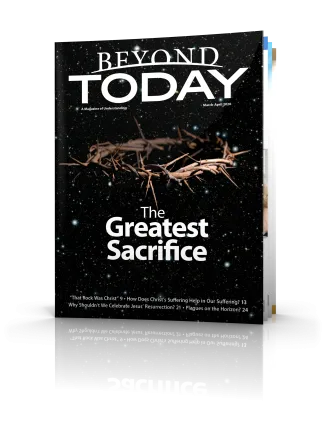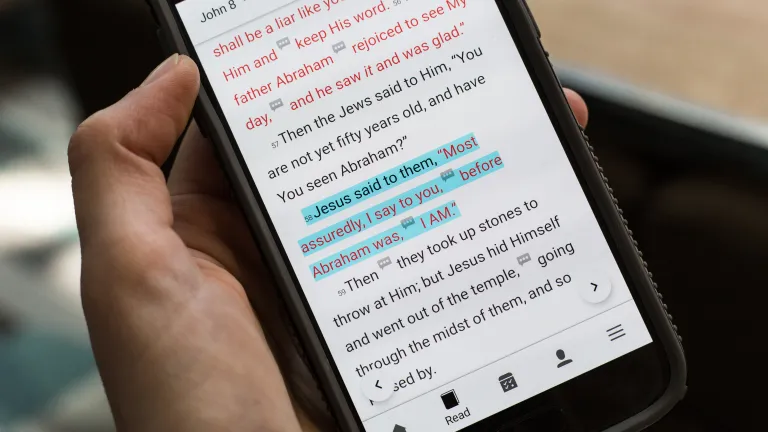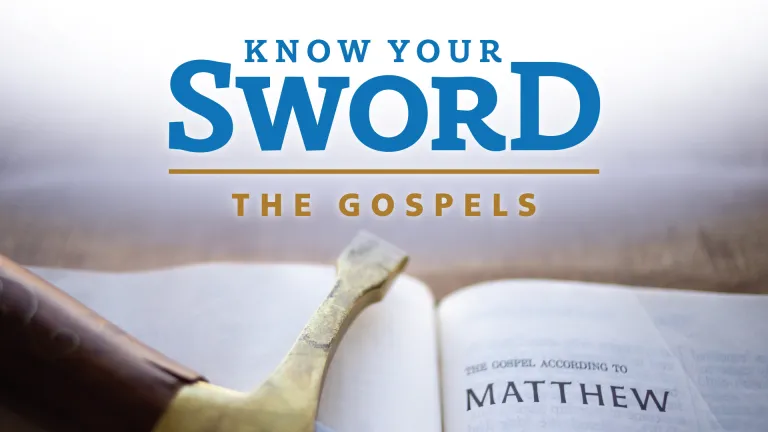“That Rock Was Christ”

The apostle Paul wrote of a “spiritual Rock” with the ancient Israelites in their wilderness wandering, stating, “And that Rock was Christ.” What did he mean by this puzzling statement?
In the Bible, the writings of the apostle Paul are well known for sometimes being hard to understand. Even the apostle Peter acknowledged this (2 Peter 3:16).
Often some things Paul wrote are a challenge for us to grasp for the simple reason that he lived and wrote in a very different culture 2,000 years ago in a very different part of the world. Our modern culture is unlike Paul’s world in many ways, and we often fail to appreciate or understand these differences when we read the Bible.
Other things Paul wrote are puzzling to us because he wrote from an intellectual background and knowledge base that was poles apart from our world today. Paul was a trained rabbi under the tutelage of the great Gamaliel, known and respected as “a teacher of the law held in respect by all the people” (Acts 5:34; Acts 22:3).
As a result, Paul was highly knowledgeable of the Hebrew Scriptures (today commonly called the Old Testament) and often makes reference to somewhat obscure passages or topics that he and his audience of that day well understood, but that today are foreign or largely unknown to most Bible readers.
A puzzling passage from 1 Corinthians
We find such an example of a partially or mostly misunderstood passage in 1 Corinthians 10:1-4, where Paul writes: “Moreover, brethren, I do not want you to be unaware that all our fathers were under the cloud, all passed through the sea, all were baptized into Moses in the cloud and in the sea, all ate the same spiritual food, and all drank the same spiritual drink. For they drank of that spiritual Rock that followed them, and that Rock was Christ” (emphasis added throughout).
Some parts of this passage are easy to understand—other parts, not so much.
In trying to understand the Bible, it’s always helpful to read the context. When we understand the overall picture the biblical writer is conveying, it’s much easier to understand the details.
In this case, Paul is writing this letter to the church in Corinth around the time of the biblical Passover and Feast of Unleavened Bread, which was the time of the year during which ancient Israel left Egypt in the Exodus some 15 centuries earlier. This timing is evident from Paul’s comment that “Christ, our Passover, was sacrificed for us” in 1 Corinthians 5:7-8 and his accompanying instructions about how to keep the Feast of Unleavened Bread with a right attitude and perspective. In 1 Corinthians 11:20-29, he also gives instructions for how Christians should properly observe the biblical Passover ceremony.
Clearly the story of Israel’s Exodus from Egypt and lessons Christians should learn from that are very much on Paul’s mind in this letter. That’s why in this passage in chapter 10 he refers in verses 1 and 2 to the pillar of cloud (see Exodus 13:21-22; Exodus 14:19-20) and to Israel’s miraculous passage through the sea (Exodus 14:24-30), and in verse 3 to the divinely provided manna that fed the Israelites for 40 years (see Exodus 16:11-35).
Layered metaphors of “the Rock”
In verse 4 Paul transitions from another element of the Exodus story to make a broader point.
He mentions that the Israelites “drank of that spiritual Rock that followed them, and that Rock was Christ.” We can read accounts of God providing water to the Israelites in the desert out of a rock Moses struck in Exodus 17:1-6 and Numbers 20:1-11. God had said He would stand on the rock, so the water really flowed to the people from Him by a miracle.
But notice that Paul was not focusing primarily on the physical rock that Moses struck and from which water poured out, but the “spiritual Rock that followed them”—that Rock being Jesus Christ.
What is this talking about? What is Paul telling us here?
We should first note that “followed” isn’t the best translation here. The Greek verb used is a form of akoloutheo, which means to “go in the same way” or to “travel together.” Forms of the word appear 92 times in the New Testament, the overwhelming majority of which are referring to the disciples or crowds accompanying Jesus Christ on His travels along the roads of Galilee and Judea during His ministry.
While the word akoloutheo can and usually does mean “follow,” a better translation in the context of the Exodus story would be “accompany” or “travel together with”—since the “spiritual Rock” with the Israelites didn’t follow them, but accompanied them as they traveled together on their journey from Egypt to the Promised Land. Accordingly, other versions translate this as “traveled with them” (New Living Translation), “went with them” (God’s Word version) and “accompanied them” (New International Version).
Paul is presenting the physical rock Moses struck to bring forth water as a type or symbol of a higher “spiritual Rock” giving spiritual drink, and Paul identifies this spiritual Rock as Jesus Christ.
The “spiritual Rock” that was Israel’s God
Where in the Exodus story do we find mention of another “Rock”? It’s found not in the books of Exodus and Numbers, as are the examples above, but another biblical book that recounts the Exodus story—Deuteronomy. The book of Deuteronomy is the last of the five books of Moses, written shortly before Moses’ death as Israel prepared to enter the Promised Land.
The book of Deuteronomy in many ways recaps the story of the Exodus and Israel’s 40 years of wandering in the wilderness. Near the end of that book, in chapter 32, Moses offers an extended praise to God, “the Lord,” who had delivered and led the Israelites and protected them even when they were unfaithful to Him.
This part of the book of Deuteronomy is a direct tie-in to the Exodus story, where Moses repeatedly talks about God being Israel’s “Rock”—today we might call it their spiritual foundation—who has been with them right up to their entering into the Promised Land. And when Paul discusses this “spiritual Rock” that accompanied the Israelites on their journey, he no doubt has this divine “Rock” of Deuteronomy 32 in mind. (Illustrating the book’s popularity and their familiarity with it, the New Testament writers allude to Deuteronomy more than any Old Testament books other than Psalms and Isaiah.)
Let’s notice how Moses in Deuteronomy 32 repeatedly refers to Israel’s God, again “the Lord” or Yahweh (as this Hebrew name is commonly thought to have been pronounced), as “the Rock.” This is from the New Living Translation, which makes some of the wording clearer.
Moses begins this chapter with praise to God, Israel’s “Rock,” in verse 3-4: “I will proclaim the name of the Lord; how glorious is our God! He is the Rock; his deeds are perfect. Everything he does is just and fair. He is a faithful God who does no wrong; how just and upright he is!”
In verse 15 Moses calls the Israelites’ God their “Rock,” this time in the context of the nation rejecting Him: “But Israel soon became fat and unruly; the people grew heavy, plump, and stuffed! Then they abandoned the God who had made them; they made light of the Rock of their salvation.”
In verse 18 Moses again calls God their “Rock,” condemning the fact that they had rebelled against Him even though He had made a nation of them: “You neglected the Rock who had fathered you; you forgot the God who had given you birth.”
In verses 30-31 Moses compares the Israelites’ “Rock,” their God, to the false and unfaithful gods worshipped by the surrounding nations: “How could one person chase a thousand of them, and two people put ten thousand to flight, unless their Rock had sold them, unless the Lord had given them up? But the rock of our enemies is not like our Rock, as even they recognize.”
In this chapter alone Moses refers to the Israelites’ God five times as their “Rock.” Obviously Paul, highly knowledgeable biblical scholar that he was, had this in mind in referring to the events of the Exodus and wilderness journey and telling us “that Rock was Christ.”
The surprising truth about the God of Israel and Creator of all things
In Paul’s phrase—“and that Rock was Christ”—we see an amazing truth of the Bible made plain. Most people assume that God the Father was the God who directly interacted with individuals, groups and nations during the Old Testament period. But Paul here tells us that in fact the Being who did so, at the direction of the Father, was the One who would later be born in the flesh as Jesus Christ.
Paul confirms this a few verses later in 1 Corinthians 10:9, where he writes of another significant event that took place during the Israelites’ journey from Egypt to the Promised Land: “We must not put Christ to the test, as some of them did and were destroyed by serpents,” wrote Paul (NLT). The incident he is referring to can be found in Numbers 21:5-9, where the people rebelled against God and, as a result, “the Lord sent poisonous snakes among the people, and many were bitten and died” (verse 6, NLT). Who was the Lord or God whom the Israelites tested there? Paul plainly tells us it was Jesus Christ!
How would Paul know that this God who interacted with Moses and the Israelites was the same Being who would later be born in the flesh as Jesus Christ? Keep in mind that Paul, after his miraculous conversion, was apparently directly taught by Christ for three years in Arabia before meeting any of the other apostles (Galatians 1:11-18).
And writing under God’s inspiration, he tells us in Colossians 1:16 regarding Jesus: “For by Him all things were created that are in heaven and that are on earth, visible and invisible, whether thrones or dominions or principalities or powers. All things were created through Him and for Him.”
Here Paul clearly tells us that Jesus Christ was the One who created not only the physical universe we see around us, but also the invisible spirit universe or dimension of angels. These were, Paul tells us, “created through Him and for Him.”
In all this we see that Paul, under God’s inspiration, tells us that Jesus Christ is the Creator, the One through whom God the Father created the physical universe and the angelic realm, and also that Jesus was the God and Lord who interacted with Moses and the Israelites during their journey from Egypt to the Promised Land.
“No one has seen God at any time”
The apostle John made several remarkable statements that help us understand Jesus Christ’s role during the Old Testament period. In John 1:18 he tells us: “No one has seen God at any time. The only begotten Son, who is in the bosom of the Father, He has declared Him.”
Earlier in this chapter (verse 14) John explained that he was a personal eyewitness of “the Word” who became flesh as Jesus Christ. So “God” in verse 18 cannot refer to Jesus even though Jesus was also God (verses 1-3). The “God” whom no one has ever seen at any time thus has to be referring to God the Father.
Notice also that John says Jesus Christ “declared” the Father. Other versions translate this as “made him known” (New International Version, English Standard Version, New Revised Standard Version) or “reveal[ed] Him” (Green’s Literal Translation).
If God the Father was known to the Israelites as God during the Old Testament period, why would Jesus need to make Him known? That doesn’t make sense. There’s no need to reveal the Father if the Father was already known when Jesus came.
John repeats this exact same statement in one of his epistles: “No one has seen God at any time” (1 John 4:12). John apparently wrote near the end of the first century. At the time it seems that he was the last of the apostles still alive. He’d had more than half a century to reflect on his personal time with Jesus Christ and to allow Jesus’ teachings—including Jesus’ own statements that no one had ever seen God—to deeply sink in. Surely John knew exactly what he was saying.
We also see two such explicit statements from Jesus Christ Himself. Notice John 5:37: “And the Father Himself, who sent Me, has testified of Me. You have neither heard His voice at any time, nor seen His form.”
And just to be clear, Jesus again says that no one has ever seen the Father in John 6:46: “No one has seen the Father except the one who is from God; only he has seen the Father” (New International Version). Here Jesus plainly says that no one has seen the Father except the One who is from God—referring to Himself. He alone has seen the Father. No human being has ever seen the Father.
The biblical record of people who saw God
Yet in the books of the Old Testament period we see that a number of people did see God. They include:
• Abraham (Genesis 12:7; Genesis 15:1; Genesis 18:1).
• Isaac (Genesis 26:2, Genesis 26:24).
• Jacob (Genesis 28:13; Genesis 32:30; Genesis 35:9-10).
• Moses (Exodus 3:6; Exodus 33:11, Exodus 33:21-23).
• Moses, Aaron and the 70 elders of Israel (Exodus 24:9-11).
• Joshua (Joshua 6:2).
• Gideon (Judges 6:14).
• Solomon (1 Kings 11:9).
Nearly all of these are described as face-to-face encounters. Two are specifically described as visions, including one of these encounters with Abraham and one with Jacob. But in addition to those visions, Abraham and Jacob had face-to-face encounters with God also—during which Abraham ate a meal with God and Jacob wrestled with God.
In these various encounters, the “God” who appeared and spoke with these individuals is identified as “God” (Hebrew Elohim), “the Lord” (Hebrew YHWH or Yahweh), “the God of Israel,” “the God of your fathers,” “the God of Abraham, the God of Isaac, and the God of Jacob,” “God Almighty” (Hebrew El Shaddai), “the word of the Lord,” “the Angel of the Lord,” “I AM WHO I AM” and “I AM.”
How, then, do we reconcile “No one has seen God at any time” with the many individuals who saw God?
Earlier we saw multiple statements from the apostle John and from Jesus Christ Himself that no one has seen the Father at any time. So who did these individuals see when they saw God? The only way we can make sense of this is to understand that no man had seen God the Father at any time, yet people had nevertheless seen One who was also God.
What they saw as recorded in these many passages, and at other times when God appeared to individuals, was the Word who was also God (John 1:1), the One who was born in the flesh as Jesus. With this understanding, there is no contradiction. We know that “Scripture cannot be broken” (John 10:35).
What we see revealed in Scripture from these verses is that Jesus was the One who interacted with the patriarchs and prophets and the people of Israel as the Lord or God on behalf of the Father. The One who became the Father was not generally known to the Israelites when Christ came. They had never seen the Father, but only the Word or Spokesman of God, Jesus Christ, who came to reveal the Father.
Jesus was the “I AM” who spoke to Moses
Jesus Himself clearly said this, and the people who heard Him got the point of what He was telling them. Notice the exchange in John 8:57-58, where Jesus was in a heated debate with some of the Jews who opposed Him, and He said that Abraham rejoiced to see His day.
“Then the Jews said to Him, ‘You are not yet fifty years old, and have You seen Abraham?’ Jesus said to them, ‘Most assuredly, I say to you, before Abraham was, I AM.’”
Here Jesus specifically told them of His divine identity—that He existed before Abraham and, more amazing still, that He was the God who had interacted with people during the Old Testament period. Who did He specifically claim to be?
We find the answer in Exodus 3:13-14, where God appeared to Moses at the burning bush promising to deliver the Israelites out of their Egyptian slavery.
“Then Moses said to God, ‘Indeed, when I come to the children of Israel and say to them, “The God of your fathers has sent me to you,” and they say to me, “What is His name?” what shall I say to them?’ And God said to Moses, ‘I AM WHO I AM.’ And He said, ‘Thus you shall say to the children of Israel, “I AM has sent me to you.”’”
Jump 15 centuries forward, and who did Jesus say He was? Returning to what we just read in John 8:58, “Jesus said to them, ‘Most assuredly, I say to you, before Abraham was, I AM.’”
And notice what happened immediately after Jesus said these words: “Then they took up stones to throw at Him; but Jesus hid Himself and went out of the temple, going through the midst of them, and so passed by” (John 8:59).
The Jews who heard Jesus say these words realized what He meant—that He was claiming to be the “I AM” who had interacted with Moses. And how did they react? They immediately took up stones to stone Him to death for claiming to be God!
The amazing truth of Jesus’ identity
Putting all of these scriptures together, we see a remarkable picture emerge: The One who came to earth as a flesh-and-blood human being, Jesus Christ, was in fact the One who interacted with people as God throughout the Old Testament period.
These are not all the scriptures pertinent to this subject, but they are enough to abundantly demonstrate that the One who spoke to and interacted with human beings in the Old Testament period as God on behalf of the Father was the One we know today as Jesus Christ.
This is not just opinion or conjecture, but from the direct statements of the apostle Paul, Jesus’ beloved disciple John and Jesus Christ Himself. Likewise the apostle and Gospel writer Matthew affirmed Jesus to be Immanuel, meaning “God with us” (Matthew 1:23), and the apostle Thomas proclaimed Him “my Lord and my God” (John 20:27-29).
To be sure, Jesus always directed worship toward God the Father and was totally subservient to Him (John 4:23; John 5:19, John 5:30; John 8:28; John 10:18, John 10:29, John 10:37; John 12:49-50; John 14:10, John 14:24; John 15:10). In the same way we must always put God the Father first and honor Him above all. But Jesus accepted worship also without dissuading people (Matthew 8:2-3; Matthew 9:18-19; Matthew 14:33; Matthew 15:25; Matthew 28:9-10, Matthew 28:17; Luke 24:51-52), and He said it’s God’s will “that all should honor the Son just as they honor the Father” (John 5:23).
Let us never lose sight of the astounding role of Jesus Christ throughout the Bible, knowing that He can also be our Rock accompanying us on our spiritual journey!
Many Scriptures Point to God as Israel’s “Rock”
The apostle Paul is not the only biblical writer who referred to Israel’s “Rock.” Several Old Testament writers also referred to God—or Yahweh, as many believe the Hebrew form of His name was pronounced—as their or Israel’s “Rock.” In addition to the five mentions in the book of Deuteronomy, at least 24 other verses, mostly in the Psalms, refer to God being Israel’s “Rock.”
As explained in the main article here, the apostle Paul likely had the five references to God as Israel’s “Rock” in Deuteronomy 32 in mind when he wrote in 1 Corinthians 10:4, “and that Rock was Christ.” But being an expert in all the writings of the Hebrew Scriptures, commonly called the Old Testament, he likely also had in mind a number of these other references.
Notice these 24 other verses where God is called Israel’s Rock. And included in the divine identity, as Paul made clear, is the One who became Jesus Christ!
“The Lord is my rock and my fortress and my deliverer” (2 Samuel 22:2).
“For who is God, except the Lord? And who is a rock, except our God?” (2 Samuel 22:32).
“The Lord lives! Blessed be my Rock! Let God be exalted, The Rock of my salvation!” (2 Samuel 22:47).
“The God of Israel said, The Rock of Israel spoke to me . . .” (2 Samuel 23:3).
“The Lord is my rock and my fortress and my deliverer . . .” (Psalm 18:2).
“For who is God, except the Lord? And who is a rock, except our God?” (Psalm 18:31).
“The Lord lives! Blessed be my Rock! . . .” (Psalm 18:46).
“To You I will cry, O Lord my Rock . . .” (Psalm 28:1).
“Be my rock of refuge, a fortress of defense . . .” (Psalm 31:2).
“For You are my rock and my fortress . . .” (Psalm 31:3).
“I will say to God my Rock . . .” (Psalm 42:9).
“Lead me to the rock that is higher than I” (Psalm 61:2).
“He only is my rock and my salvation . . .” (Psalm 62:2).
“He only is my rock and my salvation . . .” (Psalm 62:6).
“In God is my salvation and my glory; the rock of my strength . . .” (Psalm 62:7).
“You are my rock and my fortress” (Psalm 71:3).
“Then they remembered that God was their rock, and the Most High God their Redeemer” (Psalm 78:35).
“You are my Father, My God, and the rock of my salvation” (Psalm 89:26).
“The Lord is upright; He is my rock . . .” (Psalm 92:15).
“The Lord has been my defense, and my God the rock of my refuge” (Psalm 94:22).
“Let us shout joyfully to the Rock of our salvation” (Psalm 95:1).
“Blessed be the Lord my Rock . . .” (Psalm 144:1).
“Is there a God besides Me? Indeed there is no other Rock; I know not one” (Isaiah 44:8).
“Are You not from everlasting, O Lord my God, my Holy One? . . . O Rock, You have marked them for correction” (Habakkuk 1:12).
When Paul wrote “that Rock was Christ,” he wasn’t pulling the word “Rock” out of thin air. He knew that Moses, David, Isaiah and Habakkuk all referred to God—Yahweh—as their or Israel’s “Rock.” Paul was intimately familiar with the Hebrew Scriptures and their repeated references to “Rock” as a term applying to Israel’s God. And Paul clearly tells us who the Rock who directly interacted with the Israelites was—“that Rock was Christ.”






